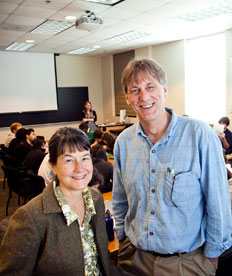Research
August 26, 2011
Courses engage students with current issues

Leslie Taylor and David Lynn will teach "Layers of Human Experience: Molecules, Methods & Metaphysical Madness."
The fall course lineups at Emory and Oxford feature academically rigorous, intriguing offerings, including several uniquely-Emory courses that further the University's strategic goals of engaged scholarship, service learning and a strong liberal arts tradition. Here is a sample of the multidisciplinary topics in campus classrooms this fall:
"An App for That"
Taught by: Benn Konsynski, George S. Craft Distinguished University Professor of Information Systems & Operations Management
Interested in designing and developing real applications, gizmos and widgets? This course examines emerging applications and services transforming software ecosystems. Drawing on the experience of actual app developers, students will create "snack-size" applications for mobile and desktop environments, along with exploring new patterns of communication between organizations and their mobile stakeholders. Business students will work on themed projects in app development, alongside Emory's Office of Communications and Marketing, the Claus M. Halle Institute for Global Learning and other schools and centers. The students' dream apps will be highlighted before Google and Apple representatives who will vote on the winning designs.
"Civil Rights Cold Cases"
Taught by: Brett Gadsden, assistant professor of African American Studies; and James M. Cox Jr. Professor of Journalism Hank Klibanoff
Between 1954 and 1968, untold numbers of civil rights activists were targeted for death. In many cases, their murders were not properly investigated. Students will join the Civil Rights Cold Case Project, where Klibanoff serves as project managing editor, to build cases against killers and conspirators who have skirted justice for more than 40 years. Students will identify and collect documents from archives in the region, engage in community outreach and conduct interviews with federal and state officials, survivors, eyewitnesses and the families and friends of victims. In the process, they will study how the news media covered the movement, the cultural and political complexities wrapped up in these unsolved crimes and the possibility for reconciliation.
"Fast Food, Slow Food"
Taught by: Goodrich C. White Professor of Anthropology Peggy Barlett, Emory's faculty liaison to the Office of Sustainability Initiatives
Students will discover the hard choices and opportunities we face as individuals, a university community and a nation in moving from an industrial to a sustainable food system. Using both scientific and popular texts, such as Michael Pollan's "The Omnivore's Dilemma," along with hands-on experience in cooking, farm work and local market sales, students will learn how to evaluate the true cost of food. Topics include organic and small-scale food production, distribution models, the health implications of diet choice and changing consumer tastes.
"Immigration and Human Rights"
Taught by: Mary Odem, associate professor of history
Combining classroom learning with weekly hands-on experience, this course examines U.S. immigration policy over the last century, with a focus on human rights implications. Students are placed in schools, clinics, a health care coalition, law and human rights organizations, and other nonprofit agencies in Atlanta to work directly with the Latino community. There, they will gain a deeper understanding of the history of immigration and the current challenges confronting immigrants.
"P.E. 101: It's Your Health"
Taught by: Lisa DuPree, instructor in the Center for Health Discovery and Well-Being; Deborah Ingalls, lecturer in health and physical education; Samuel Candler Dobbs Professor of Anthropology Michelle Lampl; and Jill Welkley, associate professor of health and physical education
Offered by the new Center for the Study of Human Health and a required course for first-year students, this class uses an innovative approach to engage students in health literacy topics. With guidance from upperclassmen, trained as peer health partners and overseen by faculty, students conduct self-assessments surrounding physical, emotional and social health, identify their existing strengths and set health-related goals around stress management, nutrition, physical activity and time management. In the end, they develop a personalized approach to healthy living.
"Layers of Human Experience: Molecules, Methods & Metaphysical Madness"
Taught by: Asa Griggs Candler Professor of Chemistry and Biology David Lynn; and Leslie Taylor, associate professor of Theater Studies
In this freshman seminar, a rotating team of Emory researchers from different disciplines will help students explore the many ways that background, disposition, perspective, and location influence human inquiry, experience and the integration of new knowledge. Students will visit the Yerkes National Primate Research Center, engage in role-playing and conduct technology-driven group research. Among the goals of the course, part of a series called On Research Discoveries By Emory Researchers (ORDER), is to help first-year students gain clarity about what they want out of their four years at Emory and beyond.
"Poverty in America"
Taught by: Michael Rich, associate professor of political science
Who are the poor? Is there a culture of poverty? Is there an urban underclass? Students will examine these questions in the context of poverty politics in America (i.e., the underlying philosophies promoted by the left and the right and their implications for policy design). Students will evaluate a variety of recent programs and strategies for alleviating poverty, including place-based and people-based approaches in metro Atlanta, Georgia and beyond.
"Psychological Conceptions of Giftedness"
Taught by: Sharon Lewis, professor of psychology at Oxford College
This seminar examines diverse conceptions of giftedness, with an emphasis on measurement models (such as the reliability and validity of intelligence and creativity tests), educational systems, acceptance by society, and the latest research findings. Students will explore how the definition of giftedness varies across cultures and across time, the origins of giftedness (from genes and/or the environment) and how gender and ethnicity influence expressions of giftedness. The course fulfills a requirement in Oxford's Student Leadership Certificate Program, which integrates lessons both inside and outside of the classroom to prepare students for leadership positions.
